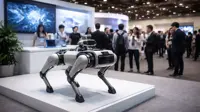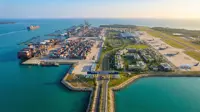Cathay Pacific accuses governments, regulators of weakening crisis-hit aviation sector
04 Jun 2009
Cathay Pacific Airways CEO Tony Tyler today said that governments and regulators are working to make life more complicated for an aviation industry that's already reeling from one of the deepest and most-sustained business downturns in recent years.
Speaking at the Asian Transport Luncheon Conference, organised by UBS in Singapore, Tyler said the industry's regulation was is anachronistic, with the industry itself being scarred by inefficiencies and anomalies, and dogged by government interference.
''Historically the industry has been viewed by governments and regulators as a cash cow. But in the last 60 years, airlines generated $32 billion in profit and $11 trillion in revenues for an average margin of just over 0.3 per cent. Even at the peak of the cycle, margins were less than 3 per cent – some cash cow!'', Tyler said.
''Regulators and governments and stakeholders like airports don't make it easy to improve on that. When they met in Brussels recently the Association of European Airlines branded regulation on the industry 'unacceptably burdensome' and that much of it was 'costly and needless'. I couldn't agree more – and it's never more apparent than when the industry is wracked by crisis, as at present.''
Citing various examples of the way governments and regulators are making life unacceptably burdensome for the industry, Tyler said that in Canada, parliamentary opposition was trying to push a bill through Federal Parliament in Ottawa that will provide passengers for compensation when a flight has been delayed or cancelled, when boarding has been denied and when an aircraft has remained on the ground for more than one hour.
''We have no problem with laws protecting passengers' rights, but they must be fair and realistic, and should be drawn up in consultation with the stakeholders affected, such as airlines. In this case, there was no such consultation and some provisions of the proposed legislation just do not make sense. For example, for the issue of delays, it's simply not realistic to ignore factors such as weather, air traffic control and airport congestion and lay the financial responsibility solely with airlines.''
Tyler also referred to recently circulated US Government instructions and guidance to airlines on how to implement its revised regulations on the treatment of passengers with disabilities by airlines in both the US and overseas.
''There are 177 pages of guidance notes. Just think of the amount of communication and training for Cathay Pacific staff around the world that this requires. Rest assured if we get it wrong we'll suffer from penalties and / or lawsuits,'' Tyler said. ''The US objects to including airlines in the European Emissions Trading Scheme because of its extra-territorial application – and I agree. But what about the extra-territoriality of their own regulations?
''Some of the things we have to do are simply unrealistic. For instance, if a visually impaired person can't read our website, so phones us instead, whoever answers the phone has to be able to give full and detailed information on every fare on our website. Just think for a moment about how practical that is going to be.
''And some of the 177 pages refer to rules about carrying service animals in the cabin. At least foreign carriers only have to carry dogs as 'service animals' - US carriers will also have to carry miniature horses or monkeys if the passenger needs them – even if only for psychiatric or emotional support.''
Tyler pointed to other anomalies faced by the industry, including the way the UK government has used the environment to excuse or justify massive increases in its air passenger duty (APD) beginning November this year. He also expressed disappointment with the way authorities in the US and EU have been dragging their feet over a bid from three of Cathay Pacific's oneworld partners - American Airlines, British Airways and Iberia - for worldwide antitrust immunity.
''We live in a world where politicians and bureaucrats sing the praises of competition.Yet some of their actions speak louder than words,'' Tyler said. ''Rival global air alliances SkyTeam and Star Alliance have already enjoyed transatlantic antitrust immunity for some years, putting our oneworld alliance at a distinct disadvantage.
''If the oneworld carriers receive their clearance – as they should – it will mean stronger inter-alliance competition, more choice, more services and more benefits for customers. It's completely illogical and unreasonable that they shouldn't operate on the same playing field.''



















